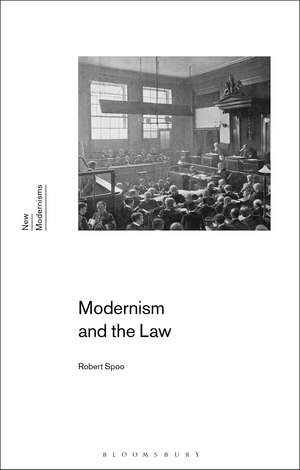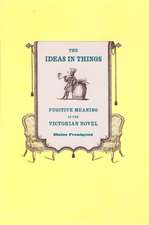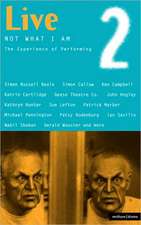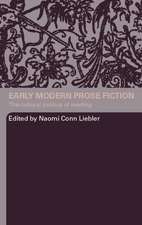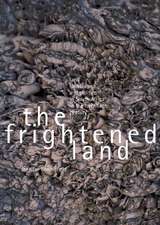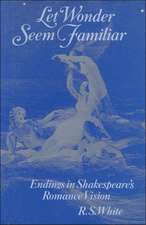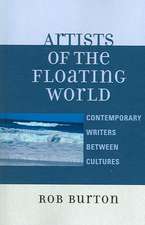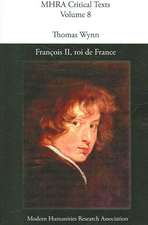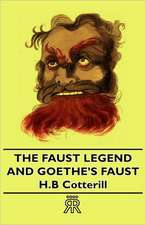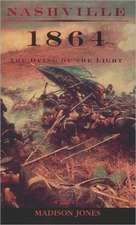Modernism and the Law: New Modernisms
Autor Professor Robert Spooen Limba Engleză Paperback – 8 aug 2018
| Toate formatele și edițiile | Preț | Express |
|---|---|---|
| Paperback (1) | 177.32 lei 43-57 zile | |
| Bloomsbury Publishing – 8 aug 2018 | 177.32 lei 43-57 zile | |
| Hardback (1) | 537.61 lei 43-57 zile | |
| Bloomsbury Publishing – 8 aug 2018 | 537.61 lei 43-57 zile |
Preț: 177.32 lei
Preț vechi: 206.70 lei
-14% Nou
Puncte Express: 266
Preț estimativ în valută:
33.94€ • 36.88$ • 28.53£
33.94€ • 36.88$ • 28.53£
Carte tipărită la comandă
Livrare economică 21 aprilie-05 mai
Preluare comenzi: 021 569.72.76
Specificații
ISBN-13: 9781474275804
ISBN-10: 147427580X
Pagini: 208
Ilustrații: 8 bw illus
Dimensiuni: 138 x 216 x 15 mm
Greutate: 0.27 kg
Editura: Bloomsbury Publishing
Colecția Bloomsbury Academic
Seria New Modernisms
Locul publicării:London, United Kingdom
ISBN-10: 147427580X
Pagini: 208
Ilustrații: 8 bw illus
Dimensiuni: 138 x 216 x 15 mm
Greutate: 0.27 kg
Editura: Bloomsbury Publishing
Colecția Bloomsbury Academic
Seria New Modernisms
Locul publicării:London, United Kingdom
Caracteristici
Covers well-known legal trials, including the prosecution of Oscar Wilde and the censoring of Lady Chatterley's Lover and Joyce's Ulysses
Notă biografică
Robert Spoo is Chapman Distinguished Professor at the University of Tulsa College of Law, USA. A former editor of the James Joyce Quarterly, his many previous publications include Without Copyrights: Piracy, Publishing, and the Public Domain and James Joyce and the Language of History. His work on Modernism and the Law was supported by a Guggenheim Foundation Fellowship.
Cuprins
List of illustrationsAcknowledgmentsIntroduction1. Oscar Wilde, Man of Law2. Obscenity and Censorship3. Copyright, Patronage, and Courtesy4. Privacy, Publicity, Defamation, and Blackmail 5. Ezra Pound, Man of WarAnnotated List of Statutes, Treaties, and Cases CitedWorks CitedIndex
Recenzii
In a style that appropriately reads as a concise legal brief, Robert Spoo analyzes the tension between censorship (a form of "super-copyright" controlled by a government in league with "purity groups") and copyright itself, which intrinsically is incapable of protecting allegedly indecent works. . . . Literary modernism should be seen, then, as Spoo rightly sees it, as what came about when the constraints of censorship (ever porous) met in complex ways with the protections (never tight) of copyright.
Spoo's Modernism and the Law addresses (and makes admirably clear) complex issues of legislation and the capitalist marketplace, as well as the vagaries of inconsistent authors. The book is also a model for writing comparatively about Joyce across the whole field of modernist studies, and, further, Spoo's perspective has contemporary relevance for those interested in 'creative industries' and 'the creative economy' in the twenty-first century.
Modernism and the Law satisfies every expectation we might be likely to have for a casebook. It is a model of clarity written by a respected scholar. It balances general claims with well-chosen details and supplements obvious examples with a few less familiar ones. Spoo, who is as much a legal expert as a literary one, has the experience and authority to discern the broader patterns and discriminate among the different critical byways of the highly decentralized world of writing about law and literature.
For legal scholars interested in the general topic of modernism and the law, this book provides some detailed and dense information that may help serve as an introduction. What Spoo does in the book is provide a balance between the theoretical foundation necessary to best understand modernism and numerous examples of how it connects to law. For those interested in understanding the study of socio- and sociolegal studies and beyond, this book is invaluable. Summing Up: Essential.
Let's begin by stating, up front, the indisputable merit of Modernism and the Law: Robert Spoo, a leading expert on intellectual property, copyright law, James Joyce in particular, and modernism more generally, has written the definitive version of how the Law, especially in the areas of copyright, obscenity and blackmail, was integral to the development, and the occasional diminishment and suppression of the modernist movement itself. Modernism and the Law has the thoroughness of a legal brief, even down to a seventeen-page addendum of every important legal decision concerning obscenity, copyright, defamation, libel and blackmail. But Spoo writes with the narrative flow of an experienced and skilled teacher.As complete and self-contained as it is, Spoo's book, nonetheless, feels like the beginning of a new and important dialogue in modernist studies: one between the machinations of the marketplace on the one hand, and the aspirations and frustrations of literary genius, on the other.
Showcases Spoo's extensive archival work, intense understanding of legal statutes and strategies, masterful critical reading, and elegantly precise prose ... Arriving near the end of the volume, it is a striking moment, highlighting what has been suggested throughout the book: that Spoo's interest in fair and just laws is undergirded by empathy toward people victimized by laws that are inconsistent or illogical, and that his work advocates for better legal circumstances for us all.
Robert Spoo takes us on a journey to understand modernist literature, its authors, how they were affected by the law and how it changed their writing. Spoo even discusses how the law was changed to accommodate writers at times . Professor Spoo makes this an engaging work, and does not get bogged down with citations and the minutiae that many books on law do; he keeps it moving and focuses on the authors while examining how the law has changed during the Nineteenth and Twentieth Centuries.
Modernism and the Law not only deepens our understanding of an important period in literary and legal history, but also demonstrates how it can be done through this form of interpretative crossing over.
Spoo's Modernism and the Law addresses (and makes admirably clear) complex issues of legislation and the capitalist marketplace, as well as the vagaries of inconsistent authors. The book is also a model for writing comparatively about Joyce across the whole field of modernist studies, and, further, Spoo's perspective has contemporary relevance for those interested in 'creative industries' and 'the creative economy' in the twenty-first century.
Modernism and the Law satisfies every expectation we might be likely to have for a casebook. It is a model of clarity written by a respected scholar. It balances general claims with well-chosen details and supplements obvious examples with a few less familiar ones. Spoo, who is as much a legal expert as a literary one, has the experience and authority to discern the broader patterns and discriminate among the different critical byways of the highly decentralized world of writing about law and literature.
For legal scholars interested in the general topic of modernism and the law, this book provides some detailed and dense information that may help serve as an introduction. What Spoo does in the book is provide a balance between the theoretical foundation necessary to best understand modernism and numerous examples of how it connects to law. For those interested in understanding the study of socio- and sociolegal studies and beyond, this book is invaluable. Summing Up: Essential.
Let's begin by stating, up front, the indisputable merit of Modernism and the Law: Robert Spoo, a leading expert on intellectual property, copyright law, James Joyce in particular, and modernism more generally, has written the definitive version of how the Law, especially in the areas of copyright, obscenity and blackmail, was integral to the development, and the occasional diminishment and suppression of the modernist movement itself. Modernism and the Law has the thoroughness of a legal brief, even down to a seventeen-page addendum of every important legal decision concerning obscenity, copyright, defamation, libel and blackmail. But Spoo writes with the narrative flow of an experienced and skilled teacher.As complete and self-contained as it is, Spoo's book, nonetheless, feels like the beginning of a new and important dialogue in modernist studies: one between the machinations of the marketplace on the one hand, and the aspirations and frustrations of literary genius, on the other.
Showcases Spoo's extensive archival work, intense understanding of legal statutes and strategies, masterful critical reading, and elegantly precise prose ... Arriving near the end of the volume, it is a striking moment, highlighting what has been suggested throughout the book: that Spoo's interest in fair and just laws is undergirded by empathy toward people victimized by laws that are inconsistent or illogical, and that his work advocates for better legal circumstances for us all.
Robert Spoo takes us on a journey to understand modernist literature, its authors, how they were affected by the law and how it changed their writing. Spoo even discusses how the law was changed to accommodate writers at times . Professor Spoo makes this an engaging work, and does not get bogged down with citations and the minutiae that many books on law do; he keeps it moving and focuses on the authors while examining how the law has changed during the Nineteenth and Twentieth Centuries.
Modernism and the Law not only deepens our understanding of an important period in literary and legal history, but also demonstrates how it can be done through this form of interpretative crossing over.
